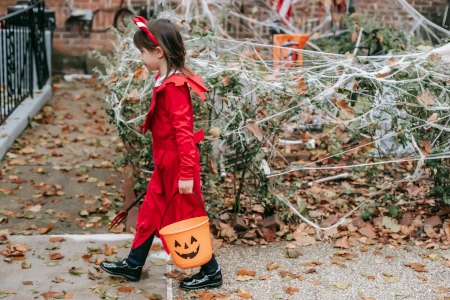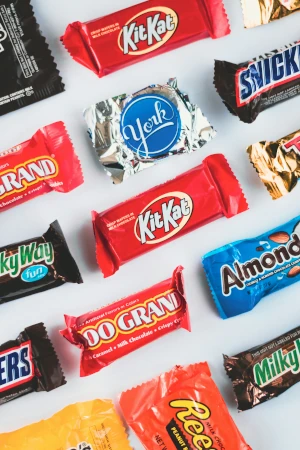Halloween Safety Tips for Parents: Taking Your Kids Trick-or-Treating
Halloween is an exciting time of year in the United States, especially for children. Schools, churches, and community organizations offer all kinds of fun activities during the Halloween season, including parties, costume contests, and group trips to the pumpkin patch. For many young people, the highlight of the season is the opportunity to go “trick-or-treating” on Halloween night—wearing a special costume, going from door to door through the neighborhood with a ‘goody bag’ for receiving candy, and saying “Trick or treat!” to the neighbors. Many adults in the United States have fond memories of participating in this community custom when they were young.
However, while Halloween can be a lot of fun, it’s also important for parents to take safety precautions to keep their kids safe. Halloween is not a dangerous holiday, but because of its unusual nature, being well prepared will help ensure that everyone has a great experience.
Here are some essential tips to help you and your children have a fun and safe Halloween night:
1. Understand What Trick-or-Treating Is
Trick-or-treating is when children dress in costumes and walk from house to house in their neighborhoods, saying “trick or treat” at each door. Neighbors usually give them candy in response. Most people expect to see trick-or-treaters on Halloween, and many homes will have lights on and Halloween decorations outside, like pumpkins, lights, gravestones, or spiderwebs. If a house has its lights off, that usually means they are not participating in trick-or-treating, and it’s best to skip that house. If a house’s decorations look too scary for your little ones, feel free to pass that one by as well.
For many children in the U.S., this is one of the most exciting nights of the year, but as parents, your first priority should be their safety.
2. Choose Costumes Carefully 
Costumes are a big part of Halloween fun! However, when selecting or making costumes for your children, you should keep safety in mind:
- Visibility: Choose bright colors or add reflective tape to your child’s costume so they can be seen easily at night. Dark costumes can make it harder for drivers to see them.
- Fit and Comfort: Ensure the costume fits well and is not too long, as this could cause your child to trip. Also, make sure shoes are comfortable for walking.
- Face Masks and Makeup: Masks can limit your child’s vision, especially in the dark. If possible, use makeup instead of masks—here is a basic face paint kit available on Amazon. If your child wears a mask, make sure that the eye holes are large enough for them to see clearly.
- Fire Safety: Some Halloween decorations, like candles inside pumpkins, may have real flames. Check that your child’s costume is flame-resistant or keep them away from these hazards.
3. Plan the Route Before You Go
It’s a good idea to plan your trick-or-treating route ahead of time. Stick to well-lit streets and neighborhoods that you know are safe. Avoid unfamiliar areas or those with heavy vehicle traffic. Many communities have specific trick-or-treating hours or organized events, so check if your neighborhood has any guidelines.
You can also look for local Halloween events that offer safe environments for trick-or-treating, such as those held at schools, shopping malls, or community centers.
4. Stay with Your Children at All Times
If your children are young, always stay with them while they trick-or-treat. Walking in groups with other parents and children is a good idea for added safety. If your children are older and want to go with friends, establish clear rules, such as staying together in a group and sticking to familiar areas. Remind them to be respectful of people’s property and to say “Thank you!” after receiving a treat.
Make sure older kids carry a mobile phone in case they need to contact you, and agree on a meeting place in case anyone gets separated.
5. Teach Children to Be Careful Around Strangers
One of the most important safety rules is teaching your children not to enter strangers’ houses or cars. They should only visit homes that have lights on and Halloween decorations outside. Trick-or-treaters always stay at the front door of the house, never going inside someone’s home.
Explain to your children that while it’s okay to take candy from neighbors during trick-or-treating, they should never accept anything that feels suspicious, such as unwrapped candy, homemade treats from people they don’t know, or items that don’t seem safe.
6. Use Safe Walking Practices
Trick-or-treating often happens after dark, so it’s important to teach your children how to walk safely at night:
- Stay on Sidewalks: Always walk on the sidewalks and not in the street. If there are no sidewalks, walk on the far edge of the road facing traffic.
- Cross the Street Safely: Use crosswalks when crossing the street and look both ways before crossing. Avoid crossing between parked cars or in areas where drivers may not see you.
- Hold Hands: If you have young children, hold their hands when walking in busy areas or crossing the street.
7. Check All Candy Before Eating 
When you return home from trick-or-treating, it’s important to inspect all the candy your children collected. Check for:
- Unwrapped or Damaged Wrappers: Throw away any candy that is not in its original packaging or looks like it has been opened or tampered with.
- Allergy Concerns: If your child has food allergies, check the candy labels to ensure it’s safe for them to eat.
- Homemade Treats: Discard any homemade treats unless they were given by someone you know and trust. It’s safest to stick to store-bought candy.
After you’ve inspected the candy, you can let your children enjoy it. It’s also a good idea to limit how much they eat in one night to prevent upset stomachs or sugar crashes!
8. Consider Reflective Gear and Flashlights
Since most trick-or-treating takes place in the evening, it’s important that drivers can easily see your children. In addition to adding reflective tape to their costumes, make sure they carry flashlights or glow sticks. You can also use reflective bags or buckets for collecting candy, which makes them more visible to others.
9. Watch for Traffic and Drivers
Halloween is a busy night, and there will likely be more cars on the road than usual. Remind your children to be aware of their surroundings and to stay out of the street. Many drivers may be distracted by the holiday excitement, so teach your children to never assume that a driver sees them. Encourage them to stop at driveways or street corners to make sure there are no cars coming before they continue walking.
If you’re driving on Halloween night, take extra care and drive slowly through residential neighborhoods.
10. Be Mindful of Weather Conditions
October weather can be unpredictable. In some places, it can be cool or even rainy on Halloween night. Check the weather forecast before heading out, and make sure your children are dressed warmly if necessary. If it’s raining, bring umbrellas and wear waterproof clothing. Wet conditions can make roads and sidewalks slippery, so take extra care when walking.
11. Have Fun and Respect Traditions
Halloween is a unique cultural tradition in the U.S., and while it may be unfamiliar to some, it’s a great opportunity for children to have fun and be part of the community. If you’re new to the tradition, it’s a good idea to talk to your neighbors or other parents in the area to learn more about how Halloween is celebrated in your specific community. Being respectful and polite to neighbors while trick-or-treating will ensure that everyone has a positive experience.
Halloween can be a fun and memorable event for children, but it’s important to prioritize safety, especially if you are not familiar with the tradition. By following these tips, you can help ensure your kids have a great time while staying safe. Plan ahead, supervise your children, and teach them important safety rules. With these precautions in place, your family can enjoy a fun and safe Halloween night!
Thanks for reading these Halloween Safety Tips!
If a young person in your family is interested in learning more about Halloween, they will enjoy Weird But True Halloween: 300 Spooky Facts to Scare You Silly by Julie Beer (available on Amazon)
Also, be sure to take a look at these 4 fun American Thanksgiving Traditions
Note: As an Amazon Associate, I earn from qualifying purchases, at no additional cost to you. Recommended resources are carefully selected and help support the operation of my blog. Thanks for clicking!
Have a comment or a question about Halloween in America? Share it below!





0 Comments